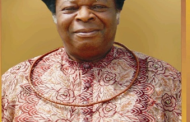Noo, late Saro-Wiwa’s daughter and an award winning author is doing wonders with words, turning a major global narrative 360 degrees. Hitherto, the biggest phenomenon in post-Cold War geopolitics of the African space has been ‘China in Africa’ and all the big disputation over what implications it comes with and all that.
Now, with a book, Noo who is also a journalist is turning around the narrative and giving Africans the more active subject position. According to a Semafor Africa story, the book released slightly over two weeks ago by now and titled, Black Ghosts: A Journey Into The Lives of Africans in China addresses the opportunities for African people and their experiences living in China.
Semafor says Noo Saro-Wiwa was born in Port Harcourt, Nigeria, and raised in England. It didn’t miss out that she is the daughter of the late Nigerian activist and author Ken Saro-Wiwa and that she published Looking for Transwonderland: Travels in Nigeria in 2012.

Noo, journalist and author
So, doesn’t Noo then reminds one of that portion of Achebe’s No Longer At Ease where Obi Okonkwo’s father was engaging elders in a theological disputation over re-incarnation? While the elders felt Obi Okonkwo was the return of his father, Obi Okonkwo’s father who was already a convert argued against that possibility. It was vintage Achebe in handling the spaces of tension between the Western/colonial worldview and those of their colonial preys.
Now, we are talking of Ken Saro-Wiwa whose daughter can be argued to be a literary re-incarnation of. She is not only an award winning author, she is also a journalist, all of them in the world of words.
Semafor’s interview with her is reproduced below:
By Muchira Gachenge
In your interactions with the subjects of your new book, what were the recurring motifs that explain Africans’ desire for a better life in China?
China can sometimes offer an acceptance and social mobility that Africans would struggle to find in their home countries or Europe. Some Nigerians told me that they prefer to operate in China where the rule of law is tighter, electricity is constant and infrastructure is better. The universities are better funded too.
What have you learned, through the experiences of Africans, about racism in China and the West?
When it comes to racism, China lags behind the West partly because, unlike the West, it hasn’t had black citizens whose activism has helped shape its laws and attitudes over the centuries. And China doesn’t have a global colonial past to reckon with. Having said that, China might not be as far behind as we think — they’re simply more upfront and honest about their prejudices compared to Westerners.
Can you be a successful African travel writer using an African passport?
Having a Western passport is a huge privilege. An African passport makes it harder to see the world, no doubt, but it’s not a barrier to being a travel writer. Travel doesn’t necessarily involve crossing oceans or continents. You can travel within your own country, or visit other nations in your region of Africa. The continent is so diverse — the cultural and environmental differences between southern Nigeria and neighbouring Niger, for example, are huge, yet we’re next-door neighbours. But yes, if you have ambitions to write about places like Australia, South America or Europe, then an African passport is a big hindrance. It really saddens me how different people can have different levels of access to our planet. It’s so unjust.
How has the legacy of your father influenced your work?
I’ve spent my entire adult life without him, so it’s hard to say what kind of life choices I might have made had he still been alive. My relationship with Nigeria in my twenties certainly would’ve been different, which means I probably wouldn’t have written my first book, Looking For Transwonderland, which charts my return to the country after a long absence following my father’s death. I might not even have dared to be a writer — it would feel like I was stepping on his territory. I probably would’ve done something else instead.
What Nigerian dish makes you miss home when you’re traveling on the other side of the world?
Jollof rice, fried plantain and goat meat are the Holy Trinity for me. I ate that dish twice a day every single day during my five-month trip around Nigeria in 2007-8 (back then I could eat anything I wanted without gaining weight). I also adore boiled yam with beef or goat stew.




























